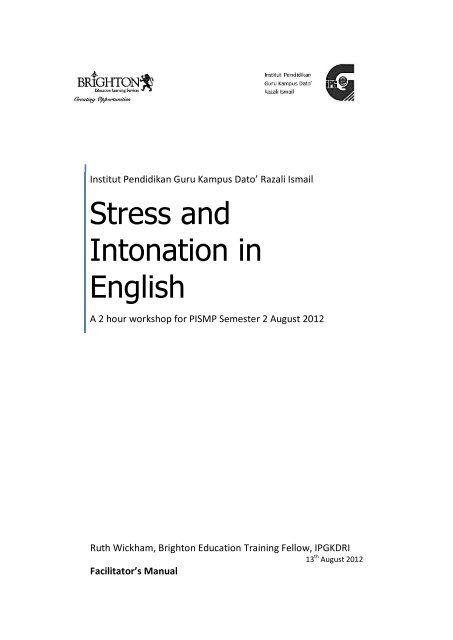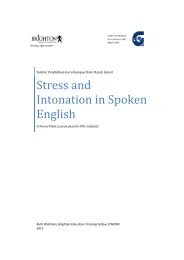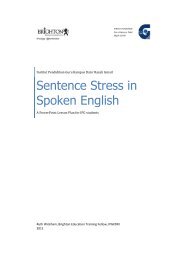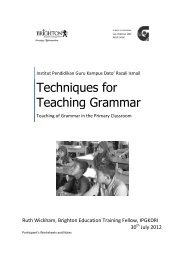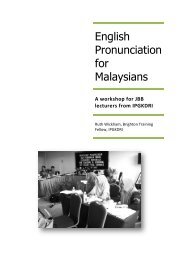Stress and Intonation in English
Stress and Intonation in English
Stress and Intonation in English
Create successful ePaper yourself
Turn your PDF publications into a flip-book with our unique Google optimized e-Paper software.
Institut Pendidikan Guru Kampus Dato’ Razali Ismail<br />
<strong>Stress</strong> <strong>and</strong><br />
<strong>Intonation</strong> <strong>in</strong><br />
<strong>English</strong><br />
A 2 hour workshop for PISMP Semester 2 August 2012<br />
Ruth Wickham, Brighton Education Tra<strong>in</strong><strong>in</strong>g Fellow, IPGKDRI<br />
13 th August 2012<br />
Facilitator’s Manual
<strong>Stress</strong> <strong>and</strong> <strong>Intonation</strong> <strong>in</strong> <strong>English</strong><br />
Contents<br />
Introduction ...................................................................................................................................... 2<br />
Objectives ......................................................................................................................................... 2<br />
Materials ........................................................................................................................................... 2<br />
Procedures ........................................................................................................................................ 3<br />
Word <strong>Stress</strong> ....................................................................................................................................... 5<br />
Words with 2 Syllables ................................................................................................................... 5<br />
Worksheet 1: 2-syllable words ................................................................................................... 6<br />
Heteronyms ................................................................................................................................... 7<br />
Worksheet 2: 2-syllable heteronyms .......................................................................................... 9<br />
Rules for Longer Words ............................................................................................................... 11<br />
Worksheet 3: ‘-ate’ heteronyms .............................................................................................. 14<br />
Worksheet 4: Revision of Word <strong>Stress</strong> Rules ............................................................................ 15<br />
Secondary stress .......................................................................................................................... 16<br />
Worksheet 5: Secondary stress ................................................................................................ 16<br />
Compound Words ....................................................................................................................... 17<br />
Worksheet 6 - Compound Words ............................................................................................. 18<br />
Worksheet 6 - Compound Words, answers .............................................................................. 19<br />
Sentence Auction ........................................................................................................................ 20<br />
Key to Sentences ..................................................................................................................... 22<br />
Sentence <strong>Stress</strong> ............................................................................................................................... 23<br />
<strong>Intonation</strong> ....................................................................................................................................... 25<br />
How to Write <strong>Intonation</strong> .............................................................................................................. 26<br />
Dictation by Facilitator ............................................................................................................. 27<br />
Dictation Worksheet ................................................................................................................ 28<br />
Workshop Exam .............................................................................................................................. 30<br />
Workshop Evaluation ...................................................................................................................... 31<br />
Ruth Wickham, Brighton Education Tra<strong>in</strong><strong>in</strong>g Fellow<br />
Facilitator’s Manual<br />
1
<strong>Stress</strong> <strong>and</strong> <strong>Intonation</strong> <strong>in</strong> <strong>English</strong><br />
<strong>Stress</strong> <strong>and</strong> <strong>Intonation</strong> <strong>in</strong> <strong>English</strong><br />
2-hour workshop for PISMP Semester 2 at IPGKDRI August 2012<br />
Introduction<br />
This is a 2-hour workshop for 132 students <strong>in</strong> PISMP Semester 2, along with their lecturers.<br />
As this is a large group, the workshop will be held <strong>in</strong> the DUO, <strong>and</strong> it will be impossible to do group<br />
work, although pair-work is possible. Nevertheless, it is <strong>in</strong>tended to be an activity-based session.<br />
Objectives<br />
Participants will:<br />
<br />
<br />
<br />
<br />
<br />
Underst<strong>and</strong> <strong>and</strong> apply the rules <strong>and</strong> guidel<strong>in</strong>es for word stress for simple <strong>and</strong> complex words<br />
Underst<strong>and</strong> the underly<strong>in</strong>g patterns of sentence stress<br />
Learn the terms <strong>and</strong> conventions associated with describ<strong>in</strong>g <strong>in</strong>tonation<br />
Participate <strong>in</strong> activities to re<strong>in</strong>force learn<strong>in</strong>g<br />
Complete a test to <strong>in</strong>dicate underst<strong>and</strong><strong>in</strong>g.<br />
Materials<br />
Facilitator needs<br />
<br />
<br />
PowerPo<strong>in</strong>t presentation, LCD<br />
Extra microphones for participants<br />
Participants need<br />
<br />
<br />
<br />
Participant’s notes <strong>and</strong> worksheets module<br />
Writ<strong>in</strong>g materials<br />
An icon<br />
Ruth Wickham, Brighton Education Tra<strong>in</strong><strong>in</strong>g Fellow<br />
Facilitator’s Manual<br />
2
<strong>Stress</strong> <strong>and</strong> <strong>Intonation</strong> <strong>in</strong> <strong>English</strong><br />
Procedures<br />
Note: PowerPo<strong>in</strong>t thumbnails are <strong>in</strong>cluded <strong>in</strong> facilitator’s notes.<br />
Although <strong>in</strong> this workshop there are a large number of participants<br />
seated <strong>in</strong> a lecture-style arrangement, this is still a workshop <strong>and</strong><br />
participants will be expected to complete activities along the way, <strong>and</strong><br />
there will also be a small exam<strong>in</strong>ation at the end.<br />
?<br />
Look for your icon. When you see your icon on the screen, it will be your<br />
turn to come down the front <strong>and</strong> answer a question. There are four<br />
people with each icon.<br />
This is the first icon selected. Will these four people please quickly come<br />
down to the front?<br />
How does stress <strong>and</strong> <strong>in</strong>tonation work <strong>in</strong> BM?<br />
Is it the same? How is it different?<br />
(In BM the word order is altered rather than chang<strong>in</strong>g <strong>in</strong>tonation – so I<br />
hear.)<br />
What about Ch<strong>in</strong>ese? How does stress <strong>and</strong> <strong>in</strong>tonation work <strong>in</strong> M<strong>and</strong>ar<strong>in</strong>,<br />
or Hokkien? (Any comments from participants.)<br />
Because stress <strong>and</strong> <strong>in</strong>tonation do not have the same function <strong>in</strong> other<br />
languages (BM, Ch<strong>in</strong>ese, …) people don’t always realise how important it<br />
is for speak<strong>in</strong>g well <strong>and</strong> be<strong>in</strong>g understood <strong>in</strong> <strong>English</strong>.<br />
Learn<strong>in</strong>g the phonemic sounds of <strong>English</strong> is only the beg<strong>in</strong>n<strong>in</strong>g. We need<br />
to also master the syllable stress <strong>in</strong> words, the word stress <strong>in</strong> sentences,<br />
<strong>and</strong> the <strong>in</strong>tonation that is l<strong>in</strong>ked to the word stress.<br />
Ruth Wickham, Brighton Education Tra<strong>in</strong><strong>in</strong>g Fellow<br />
Facilitator’s Manual<br />
3
<strong>Stress</strong> <strong>and</strong> <strong>Intonation</strong> <strong>in</strong> <strong>English</strong><br />
So first of all we are go<strong>in</strong>g to look at Word stress.<br />
Gett<strong>in</strong>g word stress wrong can cause a lot of misunderst<strong>and</strong><strong>in</strong>gs.<br />
(For example … )<br />
So what do we mean by “stress”? The stressed syllable <strong>in</strong> a word is:<br />
longer, louder, <strong>and</strong> at a higher pitch.<br />
Four people with this icon please come to the stage.<br />
What does un-stress sound like? Besides be<strong>in</strong>g shorter, quieter, <strong>and</strong><br />
lower <strong>in</strong> pitch, unstressed vowel sounds often (but not always) tend to<br />
be pronounced as a ‘schwa’. This, of course, can cause spell<strong>in</strong>g<br />
difficulties.<br />
Ruth Wickham, Brighton Education Tra<strong>in</strong><strong>in</strong>g Fellow<br />
Facilitator’s Manual<br />
4
<strong>Stress</strong> <strong>and</strong> <strong>Intonation</strong> <strong>in</strong> <strong>English</strong><br />
Word <strong>Stress</strong><br />
There are always irregularities <strong>and</strong> words that appear to break the ‘rules’ especially when talk<strong>in</strong>g<br />
about stress. However there are some useful guidel<strong>in</strong>es to refer to when fac<strong>in</strong>g an unfamiliar word<br />
<strong>and</strong> wonder<strong>in</strong>g how to pronounce it.<br />
Words with 2 Syllables<br />
Words with 2 syllables – these are the hardest to make rules about.<br />
Most 2-syllable nouns <strong>and</strong> adjectives have stress on the first syllable.<br />
(Not a very reliable rule!)<br />
Most 2-syllable verbs have stress on the second syllable. This is, of<br />
course, talk<strong>in</strong>g about the base form of the verb.<br />
Look at Worksheet 1. List all of the words from the paragraph which<br />
have two syllables. Write the part of speech (noun, verb, adjective,<br />
adverb …) for each one. Are there any words that keep this rule / break<br />
this rule?<br />
Ruth Wickham, Brighton Education Tra<strong>in</strong><strong>in</strong>g Fellow<br />
Facilitator’s Manual<br />
5
<strong>Stress</strong> <strong>and</strong> <strong>Intonation</strong> <strong>in</strong> <strong>English</strong><br />
Worksheet 1: 2-syllable words<br />
Harry was woken up by his phone beep<strong>in</strong>g. He went <strong>in</strong>to the bathroom for a shower, but realised<br />
that his shampoo bottle was empty. He had an early class to get to so he needed to hurry, but his<br />
hair felt awful <strong>and</strong> he couldn’t deny that he needed to wash it.<br />
On the way to the classroom he stopped at the little shop. He quickly grabbed a bottle of shampoo<br />
<strong>and</strong> a chocolate bar for breakfast, stuff<strong>in</strong>g them <strong>in</strong>to his backpack because he had so many th<strong>in</strong>gs to<br />
carry. His phone rang. “You’re late! Hurry up!” said his friend Billy. He could always rely on Billy.<br />
Rush<strong>in</strong>g through the door he was startled by the shrill buzz<strong>in</strong>g of the door alarm.<br />
When the police arrived Harry was sitt<strong>in</strong>g <strong>in</strong> the manager’s office hav<strong>in</strong>g a dr<strong>in</strong>k of water. It had<br />
been a stressful morn<strong>in</strong>g <strong>and</strong> it was only n<strong>in</strong>e o’clock.<br />
WORD Part of speech Rules? WORD Part of speech Rules?<br />
Ruth Wickham, Brighton Education Tra<strong>in</strong><strong>in</strong>g Fellow<br />
Facilitator’s Manual<br />
6
<strong>Stress</strong> <strong>and</strong> <strong>Intonation</strong> <strong>in</strong> <strong>English</strong><br />
Rule Breakers<br />
Which of the 2-syllable words are Rule Breakers?<br />
The four people with this icon will come down <strong>and</strong> share their answers.<br />
There are a lot of verbs with 2 syllables, but they are not 2-syllable verbs,<br />
as <strong>in</strong> hav<strong>in</strong>g 2 syllables <strong>in</strong> the base form. However there are several other<br />
verbs which do not follow the rule – can we make a rule about them? And<br />
there are a few nouns which break the rule.<br />
Heteronyms<br />
Heteronyms are words with two different pronunciations <strong>and</strong> different<br />
mean<strong>in</strong>gs. Now the rule about 2 syllable nouns/adjectives/verbs becomes<br />
mean<strong>in</strong>gful.<br />
Four people with this icon please come quickly down the front.<br />
How do you pronounce this word? ‘desert’, the noun.<br />
Ruth Wickham, Brighton Education Tra<strong>in</strong><strong>in</strong>g Fellow<br />
Facilitator’s Manual<br />
7
<strong>Stress</strong> <strong>and</strong> <strong>Intonation</strong> <strong>in</strong> <strong>English</strong><br />
What about this word? ‘desert isl<strong>and</strong>’ – is it still a noun? How is it a<br />
desert?<br />
How do you pronounce this one? ‘desert’, the verb.<br />
This is a different spell<strong>in</strong>g of the same sound<strong>in</strong>g word. How is it<br />
pronounced?<br />
Please look at Worksheet 2 <strong>in</strong> your workbook. These words all have a<br />
noun form <strong>and</strong> a verb form.<br />
These few words also have an adjective form.<br />
The people with this icon can now come down <strong>and</strong> share their answers.<br />
Ruth Wickham, Brighton Education Tra<strong>in</strong><strong>in</strong>g Fellow<br />
Facilitator’s Manual<br />
8
<strong>Stress</strong> <strong>and</strong> <strong>Intonation</strong> <strong>in</strong> <strong>English</strong><br />
Worksheet 2: 2-syllable heteronyms<br />
Look at the words <strong>in</strong> the 2 tables below. They are all heteronyms.<br />
Try say<strong>in</strong>g both words with the person sitt<strong>in</strong>g next to you.<br />
Noun (1 st syllable stress)<br />
Export<br />
Compound<br />
Object<br />
Address<br />
Combat<br />
Insult<br />
Decrease<br />
Conduct<br />
Protest<br />
Permit<br />
Transport<br />
Desert<br />
Verb (f<strong>in</strong>al syllable stress)<br />
Export<br />
Compound<br />
Object<br />
Address<br />
Combat<br />
Insult<br />
Decrease<br />
Conduct<br />
Protest<br />
Permit<br />
Transport<br />
Desert<br />
Noun (1 st syllable stress) Adjective (mostly 1 st syllable stress) Verb (f<strong>in</strong>al syllable stress)<br />
Present Present Present<br />
Perfect<br />
Frequent<br />
Perfect<br />
Frequent<br />
Content<br />
Content (f<strong>in</strong>al syllable stress)<br />
Ruth Wickham, Brighton Education Tra<strong>in</strong><strong>in</strong>g Fellow<br />
Facilitator’s Manual<br />
9
<strong>Stress</strong> <strong>and</strong> <strong>Intonation</strong> <strong>in</strong> <strong>English</strong><br />
Write sentences for 3 pairs of words, demonstrat<strong>in</strong>g the different word class.<br />
1. WORD ……………………………………………………………………………………………………………………………………………<br />
1A. noun / verb / adjective<br />
……………………………………………………………………………………………………………………………………………………………<br />
……………………………………………………………………………………………………………………………………………………………<br />
1B. noun / verb / adjective<br />
…………………………………………………………………………………………………………………………………………………………….<br />
……………………………………………………………………………………………………………………………………………………………<br />
2. WORD ……………………………………………………………………………………………………………………………………………<br />
2A. noun / verb / adjective<br />
……………………………………………………………………………………………………………………………………………………………<br />
……………………………………………………………………………………………………………………………………………………………<br />
2b. noun / verb / adjective<br />
……………………………………………………………………………………………………………………………………………………………<br />
……………………………………………………………………………………………………………………………………………………………<br />
3. WORD ……………………………………………………………………………………………………………………………………………<br />
3A. noun / verb / adjective<br />
……………………………………………………………………………………………………………………………………………………………<br />
……………………………………………………………………………………………………………………………………………………………<br />
3B. noun / verb / adjective<br />
……………………………………………………………………………………………………………………………………………………………<br />
……………………………………………………………………………………………………………………………………………………………<br />
Ruth Wickham, Brighton Education Tra<strong>in</strong><strong>in</strong>g Fellow<br />
10<br />
Facilitator’s Manual
<strong>Stress</strong> <strong>and</strong> <strong>Intonation</strong> <strong>in</strong> <strong>English</strong><br />
Rules for Longer Words<br />
Word stress is attracted to certa<strong>in</strong> syllables, <strong>and</strong> sits next to it. When a<br />
word conta<strong>in</strong>s a syllable with ‘-tion’ (<strong>in</strong> all its forms) the stress falls on the<br />
syllable just before. This is also true for words that conta<strong>in</strong> ‘-ic’.<br />
If this is your icon, please come down to the front.<br />
The four participants now try say<strong>in</strong>g these words correctly.<br />
(click to show answers)<br />
Four people with this icon, please come down the front.<br />
The four participants now try say<strong>in</strong>g these words correctly.<br />
(click to show answers)<br />
3 rd last rules: A lot of longer words are affected by a 3 rd last rule. This<br />
means that the stress falls on the Ante-Penultimate syllable.<br />
Words end<strong>in</strong>g <strong>in</strong> a consonant + y – except for ‘-ly’ have stress on the 3 rd<br />
last syllable. For example the word ‘tranquility’.<br />
Ruth Wickham, Brighton Education Tra<strong>in</strong><strong>in</strong>g Fellow<br />
11<br />
Facilitator’s Manual
<strong>Stress</strong> <strong>and</strong> <strong>Intonation</strong> <strong>in</strong> <strong>English</strong><br />
The four people with this icon can come down <strong>and</strong> try say<strong>in</strong>g these words.<br />
Try say<strong>in</strong>g each of these with stress on the 3 rd last syllable.<br />
Words that end <strong>in</strong> ‘-ise’ (or American ‘-ize’) the stress falls on the 3 rd last<br />
syllable. An example is the word ‘organise’.<br />
People with this icon please come to the front <strong>and</strong> try say<strong>in</strong>g these words.<br />
Try say<strong>in</strong>g these words with the stress on the 3 rd last syllable.<br />
Words end<strong>in</strong>g with ‘-ate’ also have stress on the 3 rd last syllable. An<br />
example is ‘concentrate’.<br />
Here are some examples. Try say<strong>in</strong>g them with the person sitt<strong>in</strong>g next to<br />
you. You may (should) have some difficulties because many of them are<br />
heteronyms <strong>and</strong> you can’t know how to say them without a context.<br />
Ruth Wickham, Brighton Education Tra<strong>in</strong><strong>in</strong>g Fellow<br />
12<br />
Facilitator’s Manual
<strong>Stress</strong> <strong>and</strong> <strong>Intonation</strong> <strong>in</strong> <strong>English</strong><br />
These ‘-ate’ words are heteronyms. Look at Worksheet 3.<br />
The people with this icon can come <strong>and</strong> share their answers to worksheet<br />
3.<br />
Worksheet 4 is an opportunity to revise all of the rules we have just<br />
learnt.<br />
Ruth Wickham, Brighton Education Tra<strong>in</strong><strong>in</strong>g Fellow<br />
13<br />
Facilitator’s Manual
<strong>Stress</strong> <strong>and</strong> <strong>Intonation</strong> <strong>in</strong> <strong>English</strong><br />
Worksheet 3: ‘-ate’ heteronyms<br />
Noun<br />
graduate<br />
advocate<br />
separate<br />
appropriate<br />
estimate<br />
associate<br />
delegate<br />
Verb<br />
graduate<br />
advocate<br />
separate<br />
appropriate<br />
estimate<br />
associate<br />
delegate<br />
Write sentences for 2 pairs of words, demonstrat<strong>in</strong>g the different word class.<br />
1. WORD ……………………………………………………………………………………………………………………………………………<br />
1A. noun / verb / adjective<br />
……………………………………………………………………………………………………………………………………………………………<br />
……………………………………………………………………………………………………………………………………………………………<br />
1B. noun / verb / adjective<br />
…………………………………………………………………………………………………………………………………………………………….<br />
……………………………………………………………………………………………………………………………………………………………<br />
2. WORD ……………………………………………………………………………………………………………………………………………<br />
2A. noun / verb / adjective<br />
……………………………………………………………………………………………………………………………………………………………<br />
……………………………………………………………………………………………………………………………………………………………<br />
2b. noun / verb / adjective<br />
……………………………………………………………………………………………………………………………………………………………<br />
……………………………………………………………………………………………………………………………………………………………<br />
Ruth Wickham, Brighton Education Tra<strong>in</strong><strong>in</strong>g Fellow<br />
14<br />
Facilitator’s Manual
<strong>Stress</strong> <strong>and</strong> <strong>Intonation</strong> <strong>in</strong> <strong>English</strong><br />
Worksheet 4: Revision of Word <strong>Stress</strong> Rules<br />
State the follow<strong>in</strong>g rules:<br />
1. 2 Syllable nouns <strong>and</strong> adjectives<br />
………………………………………………………………………………………………………………………………………………………….<br />
2. 2 Syllable verbs<br />
………………………………………………………………………………………………………………………………………………………….<br />
3. 2 Syllable heteronyms<br />
.............................................................................................................................................................<br />
4. ‘-ic’ words<br />
.................................................................................................................................................................<br />
5. ‘-tion’ / ‘-sion’ / ‘-cion’ / ‘-xion’ words<br />
……………………………………………………………………………………………………………………………………………………………<br />
6. ‘-ise’ / ‘-ize’ words<br />
…………………………………………………………………………………………………………………………………………………………..<br />
7. ‘-ate’ words<br />
………………………………………………………………………………………………………………………………………………………....<br />
8. ‘-ate’ heteronyms<br />
…………………………………………………………………………………………………………………………………………………………..<br />
Ruth Wickham, Brighton Education Tra<strong>in</strong><strong>in</strong>g Fellow<br />
15<br />
Facilitator’s Manual
<strong>Stress</strong> <strong>and</strong> <strong>Intonation</strong> <strong>in</strong> <strong>English</strong><br />
Secondary stress<br />
We don’t like to go more than two syllables without some stress!( In<br />
words that use the 3 rd last rule, for example, the last two syllables are<br />
unstressed.) So <strong>in</strong> longer words a secondary – weaker – stress is used on<br />
syllables <strong>in</strong> between.<br />
Can you work out the stress on this word? Look at Worksheet 5.<br />
Come on down if this is your icon <strong>and</strong> try say<strong>in</strong>g this word.<br />
Here is the answer.<br />
Here are some normal longer words that use secondary stress. Can you<br />
work out where the primary <strong>and</strong> secondary stress are?<br />
(click for answers)<br />
Worksheet 5: Secondary stress<br />
<strong>Stress</strong> alternates with unstress, primary stress alternates with secondary stress.<br />
1. Divide this word <strong>in</strong>to syllables us<strong>in</strong>g /.<br />
2. Mark stressed syllables.<br />
3. Mark primary stress<br />
□ <strong>and</strong> secondary stress _______ .<br />
S u p e r c a l i f r a g i l i s t i c e x p i a l i d o c i o u s<br />
Ruth Wickham, Brighton Education Tra<strong>in</strong><strong>in</strong>g Fellow<br />
16<br />
Facilitator’s Manual
<strong>Stress</strong> <strong>and</strong> <strong>Intonation</strong> <strong>in</strong> <strong>English</strong><br />
Compound Words<br />
Compound words are formed by jo<strong>in</strong><strong>in</strong>g two other words to create one.<br />
Sometimes these words are written with a hyphen, sometimes without –<br />
the rules here are unclear.<br />
Firstly, when the compound word is a noun ..<br />
Just like <strong>in</strong> the simple words, the first half of the word carries the stress.<br />
Compare this with the same two words as an adjective <strong>and</strong> noun.<br />
When the compound word is an adjective …<br />
It depends whether it is formed from two adjectives, or a noun plus an<br />
adjective form<strong>in</strong>g a compound adjective.<br />
Sometimes we can become confused between phrasal verbs, <strong>and</strong><br />
compound words made up of the same two parts. They are different.<br />
Here are some examples. Look at your Worksheet 5.<br />
Ruth Wickham, Brighton Education Tra<strong>in</strong><strong>in</strong>g Fellow<br />
17<br />
Facilitator’s Manual
<strong>Stress</strong> <strong>and</strong> <strong>Intonation</strong> <strong>in</strong> <strong>English</strong><br />
Worksheet 6 - Compound Words<br />
Use underl<strong>in</strong><strong>in</strong>g to show the correct stress on these compound words which have been given <strong>in</strong> a<br />
sentence to make the word class obvious:<br />
1. I heard a blackbird s<strong>in</strong>g<strong>in</strong>g.<br />
2. Put the seedl<strong>in</strong>gs <strong>in</strong> the greenhouse until they are taller.<br />
3. He is a bad-tempered old man.<br />
4. My gr<strong>and</strong>parents are a little old-fashioned. (2 words)<br />
5. I don’t underst<strong>and</strong> what you mean.<br />
6. The water will overflow <strong>and</strong> come out through this overflow pipe. (2 words)<br />
7. I need to go to the supermarket before I leave for the airport. (2 words)<br />
8. He is wait<strong>in</strong>g at the bus-stop on the ma<strong>in</strong> highway. (2 words)<br />
9. He came straight out of the swimm<strong>in</strong>g-pool <strong>and</strong> <strong>in</strong>to the liv<strong>in</strong>g-room to<br />
answer the telephone. (3 words)<br />
10. This ra<strong>in</strong>coat isn’t waterproof. (2 words)<br />
11. Traffic-lights are confus<strong>in</strong>g because I’m colour-bl<strong>in</strong>d. (2 words)<br />
12. What’s he like? Well he’s easy-go<strong>in</strong>g, <strong>and</strong> good-look<strong>in</strong>g, very self-confident<br />
<strong>and</strong> always well-dressed. (4 words)<br />
Ruth Wickham, Brighton Education Tra<strong>in</strong><strong>in</strong>g Fellow<br />
18<br />
Facilitator’s Manual
<strong>Stress</strong> <strong>and</strong> <strong>Intonation</strong> <strong>in</strong> <strong>English</strong><br />
Worksheet 6 - Compound Words, answers<br />
Use underl<strong>in</strong><strong>in</strong>g to show the correct stress on these compound words which have been given <strong>in</strong> a<br />
sentence to make the word class obvious:<br />
1. I heard a blackbird s<strong>in</strong>g<strong>in</strong>g.<br />
2. Put the seedl<strong>in</strong>gs <strong>in</strong> the greenhouse until they are taller.<br />
3. He is a bad-tempered old man.<br />
4. My gr<strong>and</strong>parents are a little old-fashioned.<br />
5. I don’t underst<strong>and</strong> what you mean.<br />
6. The water will overflow <strong>and</strong> come out through this overflow pipe.<br />
7. I need to go to the supermarket before I leave for the airport.<br />
8. He is wait<strong>in</strong>g at the bus-stop on the ma<strong>in</strong> highway.<br />
9. He came straight out of the swimm<strong>in</strong>g-pool <strong>and</strong> <strong>in</strong>to the liv<strong>in</strong>g-room to<br />
answer the telephone.<br />
10. This ra<strong>in</strong>coat isn’t waterproof.<br />
11. Traffic-lights are confus<strong>in</strong>g because I’m colour-bl<strong>in</strong>d.<br />
12. What’s he like? Well he’s easy-go<strong>in</strong>g, <strong>and</strong> good-look<strong>in</strong>g, very self-confident<br />
<strong>and</strong> always well-dressed.<br />
Ruth Wickham, Brighton Education Tra<strong>in</strong><strong>in</strong>g Fellow<br />
19<br />
Facilitator’s Manual
<strong>Stress</strong> <strong>and</strong> <strong>Intonation</strong> <strong>in</strong> <strong>English</strong><br />
Sentence Auction<br />
This activity is a ‘Silent Auction’. A number of sentences are offered ‘for sale’. Participants are <strong>in</strong>vited<br />
to place bids, based on the worth of each sentence.<br />
Long words <strong>in</strong> each sentence will have their stress marked – correctly or <strong>in</strong>correctly. There will be<br />
other errors <strong>in</strong> some of the sentences.<br />
<br />
A sentence that is completely correct is worth RM100.<br />
An <strong>in</strong>correct sentence is worthless. (RM 0)<br />
<br />
Any amount bid on an <strong>in</strong>correct sentence will be subtracted from the total w<strong>in</strong>n<strong>in</strong>gs.<br />
However, if participants are unsure whether the sentence is totally correct or not, they may choose<br />
to bid smaller amounts, depend<strong>in</strong>g on the level of their confidence about the sentence.<br />
Participants have an imag<strong>in</strong>ary RM 800 to spend on the 20 sentences.<br />
Instructions:<br />
1. Participants exam<strong>in</strong>e the 20 sentences <strong>and</strong> decide which ones are completely correct. They place<br />
bids of between RM10 <strong>and</strong> RM100 <strong>in</strong> the ‘bid’ column next to each sentence.<br />
2. Facilitator reads the sentences aloud, carefully pronounc<strong>in</strong>g the long words complete with correct<br />
or <strong>in</strong>correct stress. Participants check their bids.<br />
3. Participants swap their pages with someone else for check<strong>in</strong>g <strong>and</strong> mark<strong>in</strong>g.<br />
4. Facilitator carefully reads each sentence <strong>and</strong> discusses / announces which are correct / <strong>in</strong>correct<br />
<strong>and</strong> why.<br />
5. Participants mark the paper <strong>in</strong> front of them. For correct sentences the amount bid is re-written <strong>in</strong><br />
the ‘Correct’ column. For <strong>in</strong>correct sentences the amount bid is re-written <strong>in</strong> the ‘Incorrect’ column.<br />
6. Participants then add each column separately, <strong>and</strong> the total ‘<strong>in</strong>correct’ is subtracted from the total<br />
‘correct’.<br />
7. H<strong>and</strong> sheets back to orig<strong>in</strong>al participants <strong>and</strong> ask who has the highest score. (Award prizes)<br />
Participant’s Worksheet <strong>and</strong> Sentences Worksheet is below.<br />
Ruth Wickham, Brighton Education Tra<strong>in</strong><strong>in</strong>g Fellow<br />
20<br />
Facilitator’s Manual
<strong>Stress</strong> <strong>and</strong> <strong>Intonation</strong> <strong>in</strong> <strong>English</strong><br />
Sentence Auction: (Participant’s Worksheet)<br />
Instructions:<br />
A sentence that is completely correct is worth RM100.<br />
An <strong>in</strong>correct sentence is worthless. (RM 0)<br />
Any amount bid on an <strong>in</strong>correct sentence will be subtracted from the total w<strong>in</strong>n<strong>in</strong>gs.<br />
Long words <strong>in</strong> each sentence will have their stress marked – correctly or <strong>in</strong>correctly. There are other<br />
errors <strong>in</strong> some of the sentences.<br />
You have ONLY RM 800 to bid. You do not have to bid all of it. There are 20 sentences.<br />
Bid on every sentence, but don’t bid more than RM 800 altogether. If you 100% sure that a<br />
sentence is 100% correct you can bid up to RM 100 on that one sentence. If you are not totally sure,<br />
bid on the sentence accord<strong>in</strong>g to your confidence – RM0 / RM10 / RM20 / RM30 / RM40 … RM100.<br />
Number Sentence Bid Correct Incorrect<br />
1 I keep sneez<strong>in</strong>g because I am allergy to flowers.<br />
2 Sam’s job is the distribution of letters <strong>and</strong> parcels.<br />
3 Ali was upset because he saw the article as an <strong>in</strong>sult.<br />
There has been a steady decrease <strong>in</strong> the number of<br />
4<br />
graduates.<br />
5 Molly had a very bad reaction to the medication.<br />
The economical is suffer<strong>in</strong>g with the global f<strong>in</strong>ancial<br />
6<br />
crisis.<br />
7 Arif wants to do photography when he is older.<br />
Hopefully I will get a certificate when I complete this<br />
8<br />
course.<br />
9 She is overweight because her metabolism is sluggish.<br />
Could you please clarify your statement about the<br />
10<br />
abolition of tobacco?<br />
11 Please don’t desert me, I hate be<strong>in</strong>g isolated <strong>and</strong> alone.<br />
12 All of my friends <strong>and</strong> relatives will attend the reception.<br />
13 Politicians advocate exports to multiple countries.<br />
14 I would like to be present at your sem<strong>in</strong>ar.<br />
15 You should address the Queen as “Your Majesty”.<br />
16 Where did you go for your summer vacation?<br />
17 The boss <strong>in</strong>formed me that he would <strong>in</strong>crease my pay.<br />
18 This picture epitomises the work of our company.<br />
19 My son is study<strong>in</strong>g sociology at university.<br />
20 Don’t poke the tiger because you will antagonise it.<br />
Total each column<br />
Correct total m<strong>in</strong>us Incorrect total<br />
Ruth Wickham, Brighton Education Tra<strong>in</strong><strong>in</strong>g Fellow<br />
21<br />
Facilitator’s Manual
<strong>Stress</strong> <strong>and</strong> <strong>Intonation</strong> <strong>in</strong> <strong>English</strong><br />
Key to Sentences<br />
1. I keep sneez<strong>in</strong>g because I am allergy to flowers. Incorrect – should be allergic.<br />
2. Sam’s job is the distribution of letters <strong>and</strong> parcels. Correct<br />
3. Ali was upset because he saw the article as an <strong>in</strong>sult. Incorrect – should be <strong>in</strong>sult.<br />
4. There has been a steady decrease <strong>in</strong> the number of graduates. Correct.<br />
5. Molly had a very bad reaction to the medication. Correct.<br />
6. The economical is suffer<strong>in</strong>g with the global f<strong>in</strong>ancial crisis. Incorrect – should be economy.<br />
7. Arif wants to do photography when he is older. Incorrect – should be photography.<br />
8. Hopefully I will get a certificate when I complete this course. Correct.<br />
9. She is overweight because her metabolism is sluggish. Correct.<br />
10. Could you please clarify your statement about the abolition of tobacco? Incorrect – should be<br />
abolition.<br />
11. Please don’t desert me, I hate be<strong>in</strong>g isolated <strong>and</strong> alone. Incorrect – should be desert.<br />
12. All of my friends <strong>and</strong> relatives will attend the reception. Correct.<br />
13. Politicians advocate exports to multiple countries. Correct.<br />
14. I would like to be present at your sem<strong>in</strong>ar. Correct.<br />
15. You should address the Queen as “Your Majesty”. Correct.<br />
16. Where did you go for your summer vacation? Incorrect – should be vacation.<br />
17. The boss <strong>in</strong>formed me that he would <strong>in</strong>crease my pay. Incorrect – should be <strong>in</strong>crease.<br />
18. This picture epitomises the work of our company. Correct.<br />
19. My son is study<strong>in</strong>g sociology at university. Correct.<br />
20. Don’t poke the tiger because you will antagonise it. Correct.<br />
Ruth Wickham, Brighton Education Tra<strong>in</strong><strong>in</strong>g Fellow<br />
22<br />
Facilitator’s Manual
<strong>Stress</strong> <strong>and</strong> <strong>Intonation</strong> <strong>in</strong> <strong>English</strong><br />
Sentence <strong>Stress</strong><br />
Not only is there stress on one syllable <strong>in</strong> every word, but only certa<strong>in</strong><br />
words with<strong>in</strong> a sentence carry sentence stress, <strong>and</strong> this is also very<br />
important for underst<strong>and</strong><strong>in</strong>g the mean<strong>in</strong>g of the sentence.<br />
Some languages are generally syllable timed, <strong>and</strong> others are essentially<br />
stress timed. This is an important difference between <strong>English</strong>, <strong>and</strong><br />
languages like BM <strong>and</strong> Ch<strong>in</strong>ese.<br />
In a syllable timed language, each syllable takes up the same amount of<br />
time. It doesn’t mean there is no stress or <strong>in</strong>tonation, just that the tim<strong>in</strong>g<br />
of the spoken language is different.<br />
In a stress timed language such as <strong>English</strong>, the stressed words form the<br />
framework of the language, like the beat <strong>in</strong> music. Other words are<br />
squeezed <strong>in</strong> between.<br />
The people with this icon can come down <strong>and</strong> help us to practise this.<br />
Here is a simple sentence where each of the words is stressed. We can<br />
also add a number of extra function words <strong>and</strong> the tim<strong>in</strong>g of the sentence<br />
rema<strong>in</strong>s the same.<br />
Generally there are some words that carry stress – we call them ‘Content<br />
Words’, <strong>and</strong> others that generally are not stressed – these are ‘Function<br />
Words’. Of course, there are situations when this is not so.<br />
Several words <strong>in</strong> the sentence may be stressed. However the most<br />
important is the tonic syllable – this important to recognise because this is<br />
also where the <strong>in</strong>tonation is also affected.<br />
Ruth Wickham, Brighton Education Tra<strong>in</strong><strong>in</strong>g Fellow<br />
23<br />
Facilitator’s Manual
<strong>Stress</strong> <strong>and</strong> <strong>Intonation</strong> <strong>in</strong> <strong>English</strong><br />
The people with this icon can come down to practise a few sentences.<br />
Can you recognise the tonic syllable <strong>in</strong> each of these sentences – <strong>in</strong><br />
normal speech – <strong>and</strong> say them appropriately?<br />
In some situations a different word holds the tonic syllable <strong>in</strong> order to<br />
emphasis a po<strong>in</strong>t.<br />
The people with this icon can come down to practise these sentences.<br />
Try say<strong>in</strong>g these sentences with the emphatic stress as marked.<br />
Another type of emphatic stress occurs when we need to contrast<br />
between two po<strong>in</strong>ts.<br />
The people with this icon can come down <strong>and</strong> practise this po<strong>in</strong>t.<br />
Read these sentences carefully to notice the contrastive po<strong>in</strong>t that is<br />
be<strong>in</strong>g made <strong>and</strong> say them appropriately.<br />
Ruth Wickham, Brighton Education Tra<strong>in</strong><strong>in</strong>g Fellow<br />
24<br />
Facilitator’s Manual
<strong>Stress</strong> <strong>and</strong> <strong>Intonation</strong> <strong>in</strong> <strong>English</strong><br />
By stress<strong>in</strong>g a different word <strong>in</strong> this sentence the implied mean<strong>in</strong>g is<br />
completely changed each time.<br />
Can you tell the mean<strong>in</strong>g beh<strong>in</strong>d each of these spoken sentences?<br />
<strong>Intonation</strong><br />
Just as changed sentence stress can imply a very different mean<strong>in</strong>g <strong>in</strong><br />
<strong>English</strong>, so the <strong>in</strong>tonation can also carry shades of mean<strong>in</strong>g <strong>and</strong> emotion<br />
that could otherwise be misunderstood.<br />
When we say the word ‘Hello’, the <strong>in</strong>tonation depends on who we are<br />
speak<strong>in</strong>g to. For <strong>in</strong>stance, speak<strong>in</strong>g to this man who is apparently a<br />
rocket scientist is different from speak<strong>in</strong>g to our gr<strong>and</strong>mother (or even<br />
someone else’s gr<strong>and</strong>mother) <strong>and</strong> different aga<strong>in</strong> from speak<strong>in</strong>g to a<br />
baby.<br />
<strong>Intonation</strong> is very complicated <strong>and</strong> difficult to p<strong>in</strong> down, but there are<br />
four basic patterns.<br />
Fall<strong>in</strong>g tone is the most commonly used, <strong>and</strong> is very important to use<br />
correctly. It <strong>in</strong>dicates completion, <strong>and</strong> often <strong>in</strong> a conversation the other<br />
person is listen<strong>in</strong>g for it so that they know when it’s their turn to speak.<br />
Here are some examples of fall<strong>in</strong>g tone – try say<strong>in</strong>g them with the<br />
person sitt<strong>in</strong>g next to you.<br />
Ruth Wickham, Brighton Education Tra<strong>in</strong><strong>in</strong>g Fellow<br />
25<br />
Facilitator’s Manual
<strong>Stress</strong> <strong>and</strong> <strong>Intonation</strong> <strong>in</strong> <strong>English</strong><br />
Here are some further examples of fall<strong>in</strong>g tone situations.<br />
The low ris<strong>in</strong>g tone starts low, <strong>and</strong> then rises. It is used for ask<strong>in</strong>g a<br />
question when it is a genu<strong>in</strong>e question – that is we don’t know what the<br />
answer will be.<br />
The people with this icon can come down <strong>and</strong> try say<strong>in</strong>g these<br />
sentences.<br />
The high ris<strong>in</strong>g tone starts high <strong>and</strong> gets higher. This is obviously for a<br />
very emotional situation.<br />
The fall-rise tone is the most musical sound<strong>in</strong>g tone pattern. There are<br />
some people, age-groups, or regions where it is used extensively. In<br />
general British <strong>English</strong> it can often imply that we mean someth<strong>in</strong>g<br />
different from what we are say<strong>in</strong>g such as <strong>in</strong> these examples.<br />
How to Write <strong>Intonation</strong><br />
As you saw on the previous slide, I had to h<strong>and</strong>-draw a l<strong>in</strong>e to <strong>in</strong>dicate<br />
the <strong>in</strong>tonation. If you are us<strong>in</strong>g a computer to write about <strong>in</strong>tonation,<br />
you need to use recognisable symbols.<br />
Here is an example of describ<strong>in</strong>g this young Russian girl’s speech.<br />
Ruth Wickham, Brighton Education Tra<strong>in</strong><strong>in</strong>g Fellow<br />
26<br />
Facilitator’s Manual
<strong>Stress</strong> <strong>and</strong> <strong>Intonation</strong> <strong>in</strong> <strong>English</strong><br />
We are go<strong>in</strong>g to have a dictation – but to make it easy, the words are<br />
already written down for you. You need to show the sentence stress <strong>and</strong><br />
<strong>in</strong>tonation.<br />
These are the symbols to use. I will do the dictation several times (<strong>and</strong><br />
try to make it the same every time).<br />
The first time you need to note where the <strong>in</strong>tonation units start <strong>and</strong><br />
end – there is only one tonic syllable <strong>in</strong> each, <strong>and</strong> there is no reason<br />
for it to be a whole sentence Listen for the pauses – I will try to<br />
make them obvious.<br />
The second time you should listen for the tonic syllable – mark it <strong>and</strong><br />
other stress words.<br />
By the third time you should be listen<strong>in</strong>g for the tone pattern which<br />
happens on the tonic syllable <strong>in</strong> each <strong>in</strong>tonation unit.<br />
Dictation by Facilitator<br />
//The Three Billy Goats GRUFF//<br />
// ↘ "Trip, trap, trip, TRAP!”// // ↘ went the BRIDGE.//<br />
// ↘ "WHO's// // ↘ that tripp<strong>in</strong>g over MY bridge?"// // ↘ roared the TROLL.//<br />
// ↘ "Oh, it is ONly// // ↘ I,// // ↘ the TINiest Billy Goat Gruff,"//<br />
// ↘ said the BILly goat,// // ↘ with such a SMALL voice.//<br />
// __↗ "Now, I'm com<strong>in</strong>g to GOBble you up,"// // \↗ said the TROLL.//<br />
// ↘ "Oh, NO!// // \↗ Please don't take ME.// // ↘ I'm too LITtle,"//<br />
//__↗ said the BILly goat.//<br />
Ruth Wickham, Brighton Education Tra<strong>in</strong><strong>in</strong>g Fellow<br />
27<br />
Facilitator’s Manual
<strong>Stress</strong> <strong>and</strong> <strong>Intonation</strong> <strong>in</strong> <strong>English</strong><br />
Dictation Worksheet<br />
The Three Billy Goats Gruff<br />
"Trip, trap, trip, trap!”<br />
went the bridge.<br />
"Who's<br />
that tripp<strong>in</strong>g over my bridge?"<br />
roared the Troll.<br />
"Oh, it is only I, the t<strong>in</strong>iest Billy Goat Gruff,"<br />
said the Billy Goat, with such a small voice.<br />
"Now, I'm com<strong>in</strong>g to gobble you up,"<br />
said the Troll.<br />
"Oh, no!<br />
Please don't take me. I'm too little,"<br />
said the Billy Goat.<br />
Ruth Wickham, Brighton Education Tra<strong>in</strong><strong>in</strong>g Fellow<br />
28<br />
Facilitator’s Manual
<strong>Stress</strong> <strong>and</strong> <strong>Intonation</strong> <strong>in</strong> <strong>English</strong><br />
Symbols to Use<br />
• // // tonal unit (listen for pauses)<br />
• ↘ fall<strong>in</strong>g tone<br />
• __↗ low ris<strong>in</strong>g tone<br />
• ↗ high ris<strong>in</strong>g tone<br />
• \↗ fall-rise tone<br />
• Underl<strong>in</strong>e stressed words<br />
• CAPITALS for the tonic syllable<br />
Ruth Wickham, Brighton Education Tra<strong>in</strong><strong>in</strong>g Fellow<br />
29<br />
Facilitator’s Manual
<strong>Stress</strong> <strong>and</strong> <strong>Intonation</strong> <strong>in</strong> <strong>English</strong><br />
Workshop Exam<br />
For each of the questions you will be asked to listen to a word or sentence spoken by two people.<br />
You will need to decide if one of them says it correctly, or both or neither.<br />
If your icon is displayed dur<strong>in</strong>g the exam you will be asked to read one of the questions.<br />
N o A is correct B is correct Both are correct Neither is correct<br />
I don’t know!<br />
<br />
1<br />
2<br />
3<br />
4<br />
5<br />
6<br />
7<br />
8<br />
9<br />
10<br />
Ruth Wickham, Brighton Education Tra<strong>in</strong><strong>in</strong>g Fellow<br />
30<br />
Facilitator’s Manual
<strong>Stress</strong> <strong>and</strong> <strong>Intonation</strong> <strong>in</strong> <strong>English</strong><br />
Workshop Evaluation<br />
Name ………………………………………………………………………………………….. Class …………………………………………<br />
Date of Workshop ……………………………………………………………. Presenter ……………………………………………….<br />
Please feel free to add specific comments.<br />
I enjoyed the workshop.<br />
(comments?)<br />
Strongly<br />
Agree<br />
Agree Neutral Disagree<br />
Strongly<br />
Disagree<br />
I learnt someth<strong>in</strong>g useful <strong>and</strong> new.<br />
(comments?)<br />
I learnt some teach<strong>in</strong>g method as well as content.<br />
(comments?)<br />
I would like more like this.<br />
(comments?)<br />
Some th<strong>in</strong>gs <strong>in</strong> the workshop were not useful.<br />
(comments?)<br />
Other Comments<br />
Ruth Wickham, Brighton Education Tra<strong>in</strong><strong>in</strong>g Fellow<br />
31<br />
Facilitator’s Manual


